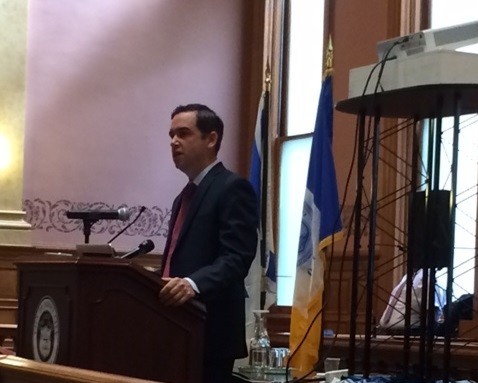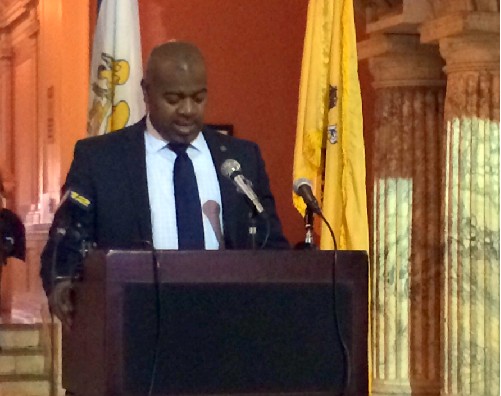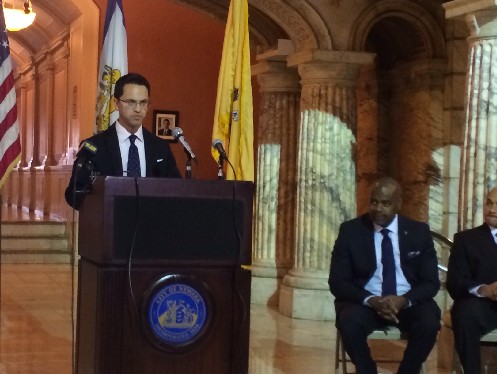Jersey City, Newark Neck and Neck in Developing Open Data Portals

Jersey City has become the first city in New Jersey to announce the availability of an open data portal, although the City of Newark is fast on its heels, and there is a statewide open data initiative on its way.
The Jersey City portal includes Excel spreadsheets containing raw data on the functions, activities and operations of a specific department or agency. The city is continuing to add data sets to this portal, and will one day add a layer of analysis to help people better visualize the data.
Both Jersey City and Newark are working with Rutgers University (Newark) on a statewide open data initiative that will be revealed to the public shortly.
Newark is also set to reveal its own portal, which is up but hasn’t been formally announced. The public announcement of Newark’s portal was delayed because of the death of beloved Rutgers professor Clement Price, an important member of the Rutgers-Newark community and of the Newark community as a whole.
According to Seth Wainer, CIO for Newark’s Office of Information Technology, Rutgers has agreed to provide a hub for Newark and other, smaller New Jersey cities for posting their data. Mayor Ras Baraka is behind the push for open data in the state’s largest city, Wainer said.

Wainer had high praise for the team at Rutgers that is helping Newark achieve its goal. Rutgers “is providing us with a conduit for open data in the state and some very enthusiastic and talented programmers. We are leveraging free code and open software.”
Speaking about Jersey City, Wainer said, “We are very happy about what they’ve done.”

According to the Jersey City portal site, “The Fulop [Jersey City Mayor Steven Fulop] administration is committed to improving government transparency and access to information.” The portal pages will provide a variety of data, including operational data, locations of municipal services or landmarks, and a variety of other miscellaneous information, according to the portal..
Navigation through topics on the portal is performed through a side menu. Under one of the items, “Operational Data,” users can download spreadsheets about the operation of the Jersey City Fire Department, Housing Authority, Parking Authority and the Office of Emergency Management.
Looking at a spreadsheet available for the fire department, a user can see such items as weekly call data by battalion. The call data shows line items such as which fires were residential and which were in other structures, indexed by the battalions that answered the calls. Users can find out how many times the fire department helped other municipalities. There are also statistics on false alarms by fire battalion.

According to a note from Brian Platt, an aide in the Jersey City mayor’s office, “in addition to operational data, it [the portal] includes maps of key landmarks and other important Jersey City sites, a full set of redevelopment plans for the city, and demographic data from the U.S. Census Bureau. We are still developing our budget visualization tool. Hopefully, we will be able to launch in the next couple of weeks.”
He added, “This is so far a work in progress, and moving forward we will continue to add data sets to it and build this out, one step at a time, in order to assure success each step of the way.”
Open JC cofounder Anna Lukasiak praised Jersey City for proactively moving toward a complete open data policy. “Availability is the just the first step to being truly open. The next step for the city will involve making the data more accessible by supporting … APIs as well as expanding the scope of data included in the portal.”
Lukasiak says her group is working with Jersey City Councilwoman Candice Osborne to pass a first-in-the-state open data municipal ordinance. Councilwoman Osborne plans to introduce the ordinance to the Jersey City council later this month. The ordinance will require Jersey City to publish public data.
In addition to advocating for open data, Open JC runs the community-based Open JC open data portal, which serves as a warehouse for community data and as an index of many city PDF documents. Over time, Open JC hopes that the city will provide all public documents in machine-readable formats.
Lukasiak says that other municipalities are also trying to make their data accessible. For example, South Orange has its budget online at an interactive site that includes both raw data and visualizations (charts and graphs) about that data. Monmouth County has put a lot of records online that are searchable.
Observers have told NJTechWeekly.com that a lot of the activity in New Jersey stems from a meeting held on May 15 at Montclair State University, sponsored by the university’s NJ News Commons, where 125 open data enthusiasts gathered to learn about initiatives in New Jersey and how to get involved. According to NJ News Common’s Debbie Galant, “at the end of the day, a town hall style meeting drew suggestions from the crowd…for where the NJ open data movement should go next.”

